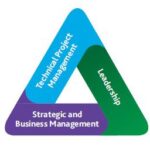Are project managers simply “doers” or are they more than that – say becoming a “thinkers”? As doers goes, the rules are relatively simple. Plan carefully and execute diligently by following some rules, guidelines, and processes. If this were the only path to project management success, then most of the project managers would eventually become great ones. Right?
What if the path is wrong or not so wrong but require a small adjustment here and there reach the destination. As Mr. David Cotgreave explained, even a tiny change a millionth of a degree, change the trajectory. It takes a far more independent mindset to observe, evaluate, and decide. All these nicely fit into the “executive habits”.
But what are “executive habits” at a deeper level? Mr. Cotgreave gave some nice examples. Here are my views: five thinking caps: 1. Think more holistically to see the big picture and strategically to ensure alignment with your organization strategies 2. Think more creatively so you are not confined to the existing box 3. Think of the golden rule on how to treat others, e.g. ethically to make sure you are making, at the minimum a legal decision, but also morally sound. 4. Think independently as much as you can so your thoughts are not drowned out by noise. 5. Think practically on the feasibility of implementation and not let “analysis paralysis” stop you from doing. Executive are both doers and thinkers.
Te Wu’s comments on the below article by David Cotgreave for Project Accelerator UK.
David Cotgreave for Project Accelerator writes: IT Projects facilitate fulfilment of business strategy, they are the wheels of organisational change and the grease that makes them turn smoothly and most crucially, how they are executed can be the difference between failure and success – or m ore positively between success and the kind of success that gives you a real advantage over your competitor.
So, for some time I’ve been encouraging Project Managers to develop “executive habits” and for client organisations to look for these capabilities either when recruiting in-house or buying in Project Management functions as a service. If projects are so key to an organisation’s success (and they are – they really, really ARE) then it makes sense that those charged with delivering them have a keen sense of the organisation, its mission and strategy and the wider landscape in which the project will be put into practice.
“Executive habits” are leadership qualities and 71% of organisations rank leadership skills as the most important tools for project managers to possess for long-term success.
In the US, the Project Management Institute (PMI) is encouraging a shift to a “Talent Triangle” – a combination of technical, leadership, and strategic and business management expertise. It’s a neat Venn diagram of competences and there are wins across the board.
The sponsor, your employer or client, benefits from your new skills injected at the heart of the project, improving business outcomes and also adapting to meet your industry’s evolving needs and demands. As a Project Manager, your CV is promoted to the next level – beyond leadership to a key strategic partner in the business’ success. New skills bring new opportunities to elevate your value to the business. Who wouldn’t want that? SNIP, the article continues @ Project Accelerator, click here to continue reading…..

